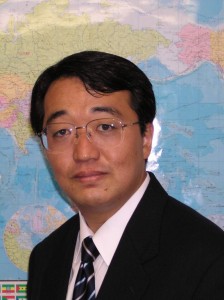緊張と統合:内村鑑三におけるキリスト教と日本の精神
このシリーズでは、私が1994年に執筆した統一神学大学院(Unification Theological Seminary)の神学課程修士論文(Divinity Thesis)を日英二か国語で掲載している。
6.無教会と日本社会の続き
内村のキリスト教徒の友人は、この場合の敬礼は礼拝行為ではないと断言した。彼は深く考えた後にその助言に従うことにし、彼自身は病気で倒れていたために同僚の教師に代わりに義務を果たしてくれるように頼んだ。しかし、時は既に遅かった。新聞はこの話を取り上げ、国中に広めた。その反響はあまりにも大きく、内村はその職を辞さざるを得なかった。
この事件はキリスト教を攻撃する機会を伺っていた者達にとっては、またとないチャンスだった。最初に仏教徒達が国粋主義的なマスコミの攻撃に同調した。彼らが主に指摘した点は、仏教は歴史を通して国体を保持し、それに同和して来たのに対して、キリスト教は「国家の安寧秩序を妨げ、臣民の義務に背く」危険な宗教であるということであった。彼らは、憲法はその様な宗教に対しては信教の自由を認めていないと主張したのである。ここに我々は、キリスト教は日本の宗教の枠組には受け入れられず、社会的・政治的な調和をもたらすには有害である、という切支丹宣教の伝説の復活を見るのである。
この事件に対するキリスト教の反応は二つに分かれた。ロシア正教会は、内村は臣民として天皇陛下に対して敬意を払うべきであった、したがって彼は責められて当然であると宣言した。プロテスタント教会自体内で、この問題に関しては意見が二つに分かれた。植村正久が率いる日本基督教会(一致教会)は、キリスト教徒は敬礼の行為そのものさえも拒否すべきであると主張した。植村を中心とする5人のメンバーは新聞に共同声明を発表し、天皇に対して神としての「宗教的礼拝」を要求されたならば、「死を以って、之に抗せざるを得ず」と宣言している。また彼らは、単なる天皇の「影像」や「勅語を記せる一片の紙」に向って「拝礼」や「稽首」を強要することに対して、疑問を呈している。この共同声明はさらなる論争を引き起こした。一方、横井時雄と金森通倫が率いる日本組合基督教会は、敬礼行為に対して寛容であった。彼らはこの論争により、しだいにキリスト教徒全体が「不敬の徒」として世の中からみなされることに対して嘆息をもらしている。
1891年から1892年の間に「教育と宗教の衝突論争」というテーマで発行された一連の論文の中で、時の帝国大学の有力な教授であった井上哲次郎は、キリスト教徒の忠誠を批判し、キリスト教の信仰は日本臣民としての原理および義務とは相容れないものであると断言した。彼はこのように、キリスト教徒は国賊であり、内村はその最たるものであると主張したのである。
VI. Mukyokai and Japanese Society. (Cont.)
Uchimura’s Christian friends assured that bowing in this case was not an act of worship. After reflection, he decided to follow and from his sick bed sent a friend and fellow teacher to fulfill the duty for him. But it was too late. A newspaper picked up the story and spread it across the country. The repercussions were so great that Uchimura was forced to resign his post.(16)
This incident became a great chance for those who had been seeking opportunities to attack Christianity. At first Buddhists joined the attacks of the nationalistic mass communications. Their main point was that while Buddhism had been supportive and accommodated itself to the national polity (kokutai) throughout history, Christianity was a dangerous religion “prejudicial to peace and order, and antagonistic to their duties as subjects.” They insisted that the constitution does not permit religious freedom to such a religion.(17)Here, we can see the revival of a legacy from Kirishitan missions that Christianity could not be incorporated into the framework of Japanese religion and would be detrimental to the cause of social and political harmony.
The response of Christianity to this incident was divided into two. The Russian Orthodox Church proclaimed that Uchimura should have paid respect for the Emperor as a subject, therefore, he deserved to be accused.(18) The Protestant Church itself was divided into two opinions concerning this issue. Nippon Kirisuto Kyokwai (Icchi Kyokwai) led by Masahisa Uemura insisted that Christians should reject even the act of bowing itself. Five members centering in Uemura issued a joint statement on a newspaper which declared that “if we are demanded a religious worship to the Emperor as a deity, we must resist it at the risk of our life.” They also lodged a protest against the coercion of the act of bowing before a mere picture of the Emperor or a paper with the Imperial Rescript on Education.(19)This joint statement caused further controversies. On the other hand, Nippon Kumiai Kirisuto Kyokwai led by Tokio Yokoi and Tsurin Kanamori was loose and tolerant to the act of bowing. They deplored that all Christians began to be regarded as disloyal by society because of this controversy.(20)
In a series of articles published in 1891 and 1892 on the theme of the conflict of education and religion (Kyoiku to Shukyo no Shototsu Ronso) a leading professor of the Imperial University, Inoue Tetsujiro, attacked the loyalty of Christians and asserted that the Christian faith was incompatible with the principles and duties of a Japanese subject. Thus, he maintained, Christians were traitors and Uchimura was an outstanding example.(21)
(16)op cit, Ebisawa and Ouchi, p.296.
(17)Ibid., Vol.2, p.35.
(18)Ibid., Vol.1, p.150.
(19)Ibid., Vol.1, p.156.
(20)Ibid., Vol.2, p.37.
(21)op cit, Thomas, p.204.
